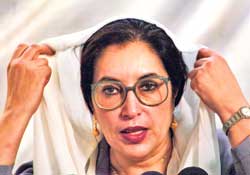
Bombs add to bloody Bhutto family historySLAMABAD, (AFP) - Iconic Pakistani politician Benazir Bhutto had already had a life filled with personal tragedies before the bomb carnage among the mammoth crowd that welcomed her home from exile. Bhutto survived unhurt when a suicide bomber killed 133 people in a huge procession she led in Karachi on Thursday after setting foot on Pakistani soil for the first time in eight years. The two-time prime minister of the turbulent Islamic republic embarked on her political career in her teens after her father Zulfiqar Ali Bhutto was hanged by then military dictator General Zia-ul Haq. Bhutto senior, who laid the foundations for Pakistan's nuclear capability as president and later prime minister, was toppled in 1977 by Zia, who sent him to the gallows spurning all international appeals. Zia fostered Islamic militancy in Pakistan and made crushing the Bhutto family and its Pakistan People's Party his mission until he died in a plane crash in 1988.
The party founded by Zulfiqar Ali Bhutto in 1967 kept going despite persistent persecution by the powerful military establishment. And the Bhuttos have remained one of Pakistan's top political families amid a string of tragedies. In 1985, Benazir's brother Shah Nawaz died of poisoning in his apartment in the south of France. Eleven years later, her older brother Murtaza, who was accused of involvement in terrorism, was shot dead in Karachi. Benazir blamed Pakistan's intelligence services for his death. The ex-premier, despite the apparent failure of her two corruption-tainted terms in power, continues to enjoy huge support, particularly among the millions of urban and rural poor in this impoverished South Asian nation. The family is still disliked by the military because of Zulfiqar Ali Bhutto's insistence on civilian rule in a country that has spent more than half its existence since 1947 under the thumb of the army. He forcibly retired a number of senior officers against the backdrop of Pakistan's military debacle with India in 1971, when East and West Pakistan split to become Bangladesh and Pakistan. Bhutto's recent turnaround to negotiate with military ruler President Pervez Musharraf has been widely criticised, but she insists her aim is a peaceful transition from military to civilian rule. And the massive turnout in Karachi showed she still commands the loyalty of a large section of the population who respond positively to her. While she retains the potential to win a third term in power in general elections in January, her future remains uncertain, threatened by assassination attempts or the displeasure of the powerful military top brass, analysts say. "A military with political ambitions will always distrust a leader whose popular appeal is widespread," political analyst Hasan Askari told AFP."The army will not tolerate any civilian leader who could challenge their monopoly of political power and Bhutto is the only leader who retains the potential to mobilise people against the military," he added. "In the political domain the strengths of a leader or a family evoke a lot of opposition from their political competitors, and Bhutto's family is one such example. Their political successes become liabilities for them." |
|| Front
Page | News | Editorial | Columns | Sports | Plus | Financial
Times | International | Mirror | TV
Times | Funday
Times || |
| |
Reproduction of articles permitted when used without any alterations to contents and the source. |
© Copyright
2007 | Wijeya
Newspapers Ltd.Colombo. Sri Lanka. All Rights Reserved. |
